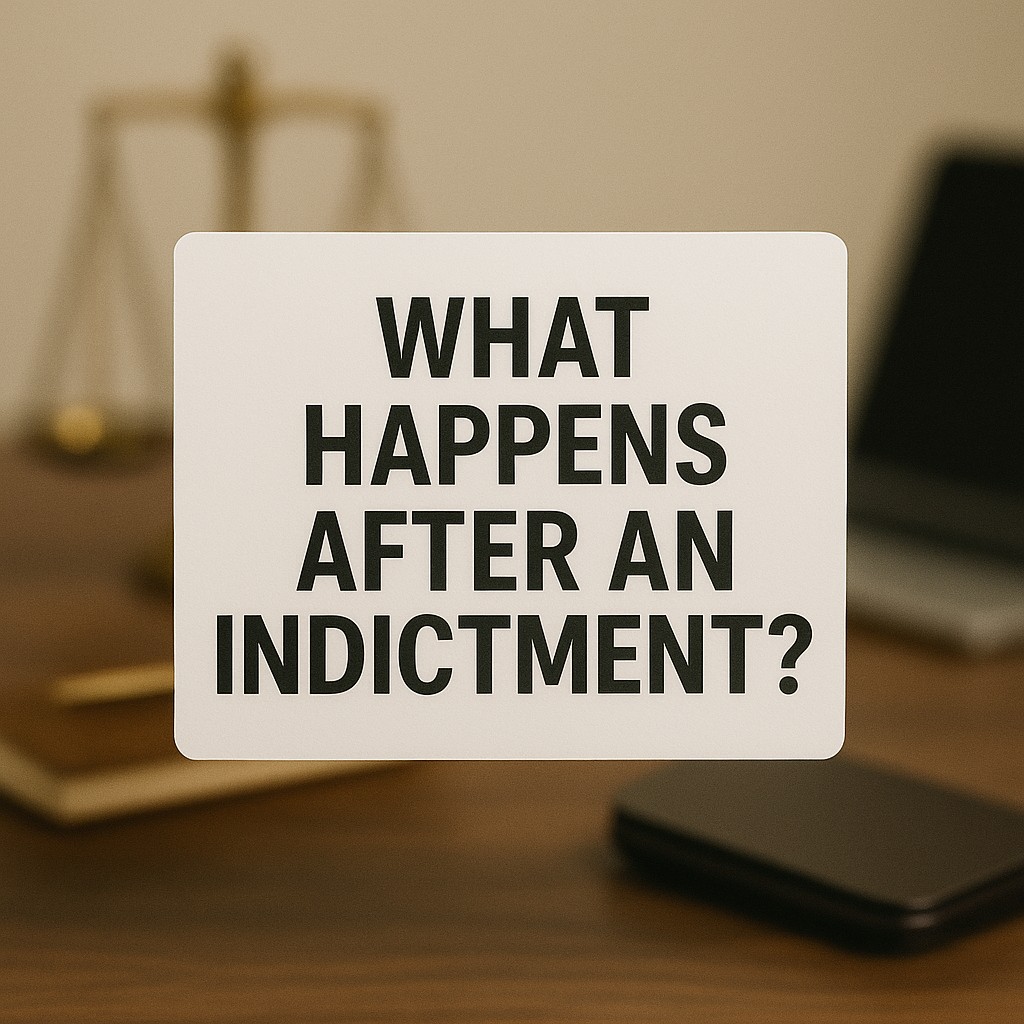
You just found out that you have been indicted. Maybe it comes as a surprise, or you felt it was coming. Either way, it is a life-changing moment, and you likely have one urgent question: what happens after an indictment? In California, the answer can impact everything from your freedom to your future.
Below, we will explain what an indictment means, how the process works, and what steps you can take to protect yourself.
What Does It Mean to Be Indicted?
You were indicted, meaning a grand jury has formally accused you of committing a crime or crimes. People sometimes confuse an indictment with an arrest or a conviction, but they are different things. An indictment means there is probable cause to charge you; it is not proof of guilt.
In California, the grand jury is a group of citizens who review evidence presented by a prosecutor. Unlike a trial, there is no judge or criminal defense attorney involved at this stage. The grand jury decides only whether there is enough evidence to proceed with criminal charges.
This process is often used for serious felonies and/or high-profile cases. Importantly, an indictment is not a conviction. It only means you have been formally charged, not proven guilty. It simply allows the state to prosecute you.
An indictment can be used in place of a preliminary hearing to move a case forward. Think of it as the beginning, not the end, of the process.
What Happens During Indictment Proceedings in California?
Most defendants never appear before the grand jury because the proceedings are secret and one-sided. Only the prosecutor presents evidence, and the accused has no right to testify or offer a defense at that stage. During an indictment:
- Prosecutors present documents, witness testimony, and legal arguments to the grand jury;
- Grand jurors can ask questions, but they do not debate guilt or innocence; and
- If 12 of 19 jurors believe probable cause exists, they return an indictment.
The secrecy protects the accused’s reputation if the jury decides not to indict. But if the grand jury does, things move fast.
What Happens After the Grand Jury Issues an Indictment?
Once a grand jury returns a “true bill,” meaning it believes there is enough evidence to support criminal charges, the court will typically issue an arrest warrant or a summons. From there, the case begins moving forward rapidly:
- Arrest or court summons. You may be taken into custody or ordered to appear in court on a specific date.
- Arraignment. At your first court appearance, the judge will read the charges and ask you to enter a plea (not guilty, guilty, or no contest). The court may set or review bail conditions, affecting whether you stay in custody.
- Pretrial phase. This includes discovery, legal motions, and discussions around possible plea agreements. The court may schedule meetings to explore resolving the case before trial.
- Trial preparation. If no plea deal is reached, both sides will begin building their case for trial.
Although an indictment comes from a grand jury rather than a prosecutor’s complaint, the legal process that follows generally mirrors other criminal proceedings in California. Each stage is time-sensitive and carries its own risks and opportunities.
After an indictment, what happens to the defendant? From your perspective, an indictment may feel like the system has already made up its mind. But remember, you are presumed innocent, and you still have rights. This is the time to begin preparing for trial or negotiating a resolution. Your defense attorney’s job is to seize those opportunities.
What Happens After an Indictment is Issued in Federal Court?
In some cases, especially white-collar crimes or offenses involving federal agencies, the defendant may be indicted in federal court. The process is similar in those situations but may involve different timelines, court rules, and sentencing structures. The penalties are also often steeper.
Contact a criminal defense attorney immediately if you are facing a federal indictment.
Why You Need Legal Representation After an Indictment
You are part of the criminal justice system at this stage, and the consequences can be severe. You may feel pressured to make a quick decision, accept a plea deal, or remain silent if you have been indicted. That’s precisely why it is imperative you work with a competent criminal defense team that can:
- Identify weaknesses in the prosecution’s case;
- File motions to suppress illegally obtained evidence;
- Protect your rights at every stage;
- Negotiate for reduced charges or dismissal; and
- Prepare a strong defense for trial, if needed.
Every decision made post-indictment shapes your future. The sooner you hire a defense attorney, the better.
Indicted in California? Talk to a Defense Team with Experience
At The Law Offices of Kerry L. Armstrong, APLC, we represent clients facing life-altering criminal accusations, including those indicted in state or federal court. Our firm has handled more than 100 jury trials, including high-stakes felony cases.
In San Diego, we have built a reputation for delivering tough, strategic defense with dedicated advocacy and discretion. Whether you are facing drug charges, violent crime allegations, white-collar accusations, or any other crime, we will fight for your future like it is our own.
Being indicted does not make you guilty; rather, it means it is time to build a defense plan. Contact The Law Offices of Kerry L. Armstrong, APLC, today to schedule a confidential consultation and start protecting your rights.
Resources:
- Setting Aside the Indictment or Information, Cal. Penal Code Title 6, link.
- Cornell Law School Legal Information Institute, Indictment, link.
- Stanislaus County Superior Court, Criminal Grand Jury Process, link.
- Central District of California, Federal Rules of Criminal Procedure, link.
- California Courts Self-Help Center, Guide to Criminal Court, link.


